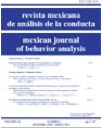A QUANTITATIVE BEHAVIOR-ANALYTIC THEORY OF DEVELOPMENT
Main Article Content
Abstract
This paper describes a quantitative analytic theory of develupment. Twa of the majar contributiuns that such a developmental theory can make are: a> an explanation of why certain tasks have tu be acquíred earlier than others (developmental sequences), and b) an account, based un selectionist principies, of the biological, cultural, organizational and individual psychology of performance. The behaviorism that can encompass these two goals incorporates quantitative analysis, where the assumptions are explicit and mathematically describable, and the measures o4 performance are quantitative. The twa Iargest differences in this theory from others occur in the deliberate separation of task and performance, and the simplification of the basic unit of analysis, which in this theory is the event rather than the behavior or the stimulus and response. The deflnition of events is explicit and simple, containing very few assumptions.
